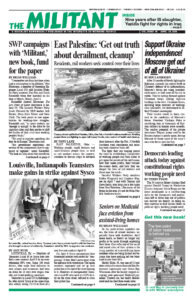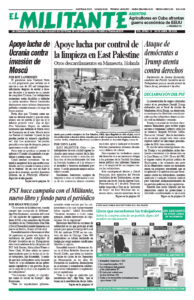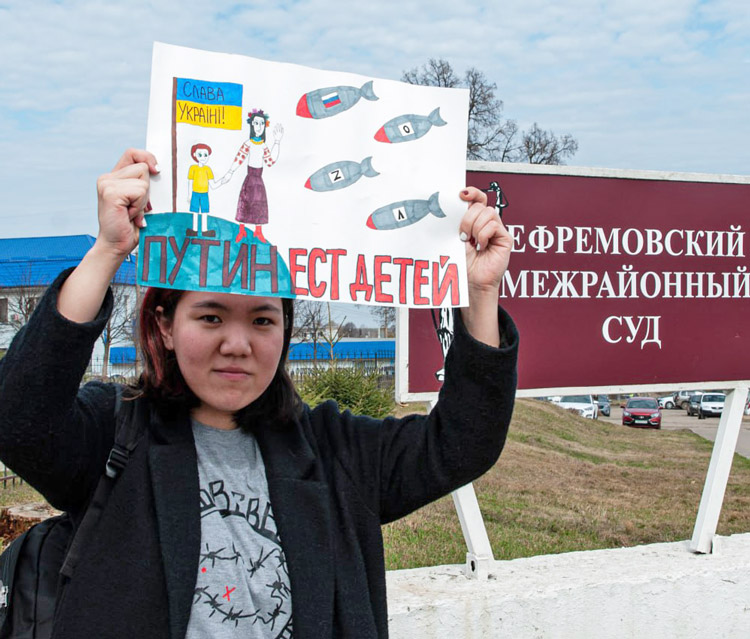After 10 months of bloody fighting for Bakhmut, currently the central battle in Ukraine’s defense of its independence, Moscow’s forces are using scorched-earth tactics to shell more of the city to rubble. They’re inching forward against Ukrainian troops holding high-rise buildings in the west. Ukrainian forces, including large numbers of working-class volunteers, are determined to defend Ukraine’s sovereignty.
Their resolve stands in sharp contrast to the conditions of Moscow’s forces. President Vladimir Putin is sacrificing tens of thousands of Russian soldiers in human wave assaults. The combat potential of the private mercenary Wagner group used by the Russian regime is nearly spent, forcing Moscow to throw more of the army’s own elite forces into the fray.
Deaths have skyrocketed among Russian troops in recent months, military veteran Vitaly Votanovsky told the BBC from Armenia. He fled from Russia after receiving death threats for exposing the growing number of gravesites of Russian soldiers in Krasnodar, southwest Russia.
If the Russian people “were to find out the true numbers of battlefield losses, they’d go crazy,” he said.
To replenish its exhausted forces the Kremlin aims to conscript hundreds of thousands more. It hasn’t declared a new mobilization for the same reason it’s hiding the truth about casualties — to try to avert protests by working people.
Several hundred paratroopers from the 331st Guards Parachute Regiment in Kostroma have been killed. The regiment’s casualties from the 14-month invasion are far higher than from the nine-year Soviet occupation of Afghanistan that ended in 1989 when 56 of its soldiers lost their lives.
Two Russian conscripts, Yury Degtyarev and Alexei Selivanov, were sentenced to three years in a penal colony by a Kursk military court Dec. 22, for refusing to fight in battle. A video shows their arrest at a lineup of conscripts in Belgorod. Over 700 similar cases are before military courts, with half already convicted.
Russification of occupied areas
Since the invasion, tens of thousands of Ukrainian children have been taken from their families by Russian forces in occupied areas of Ukraine, under the pretext that they’re being “rescued” from a war zone that Moscow created.
Dasha Rakk, a 13-year-old girl, said she and her twin sister left Moscow-occupied Kherson to attend a summer camp in Crimea for a few weeks last year. On arrival they were told they’d be staying longer. Then officials “said we will be adopted, that we will get guardians,” she told Reuters. Both sisters were part of 30 children who were reunited with their parents April 8.
“We were treated like animals,” said Vitaly, another child from Kherson. He said they were told their parents no longer wanted them. After the disappearance of her son Artem, Natalya Zhornyk and other women traveled to Moscow-occupied Ukraine in March to get him and 15 other children back. A direct car trip is only hours. But they had to make a 3,000-mile journey by traveling through Poland, Belarus and Russia. On arrival in Moscow they were grilled by immigration cops, but eventually got their children back.
Both rescues were assisted by Save Ukraine, an organization founded in 2014 to move children and their families away from intense fighting after Russian forces led pro-Moscow separatists to seize territory in eastern Ukraine.
Moscow has a long record of trying to brutally Russify countries it tries to subjugate. As part of these efforts today, the Kremlin’s forces have closed down or taken over at least 26 places of worship in Moscow-occupied parts of Ukraine. Some church buildings have been turned over to the Russian Orthodox religion. At least 29 religious leaders have been killed or seized by Moscow’s forces, and 13 places of worship desecrated, looted or destroyed.
Inside Russia Putin has stepped up arrests, trials and long sentences against opponents of his war. In the face of this, some continue to raise their voices. Outside a court in Yefremov, Yelena Tarbayeva was detained and fined $600 April 6 for holding up a drawing with “Putin eats children” written underneath. She had traveled 600 miles from St. Petersburg to protest the prosecution of Alexei Moskalyov for anti-war protests by both him and his 12-year old daughter, Maria.


